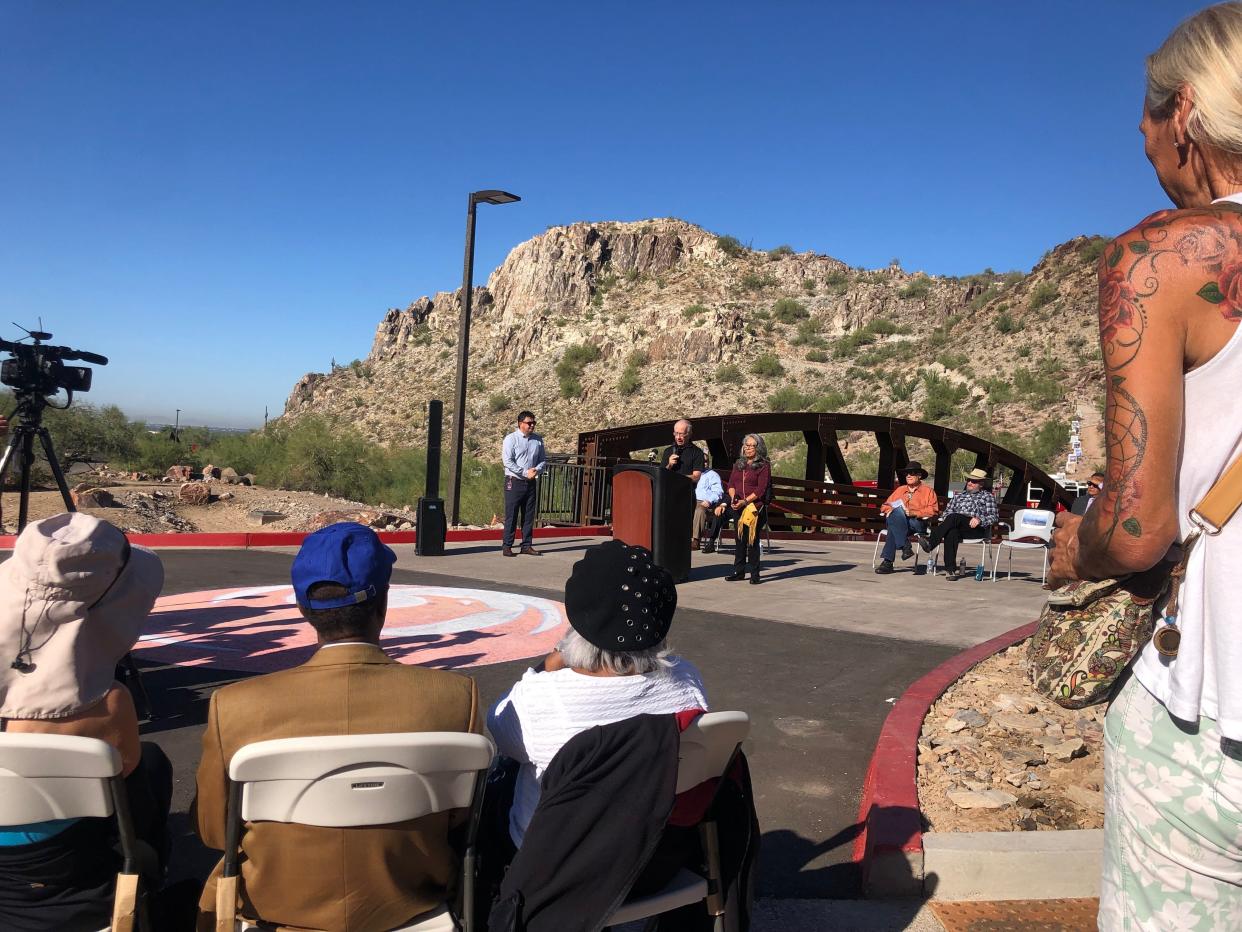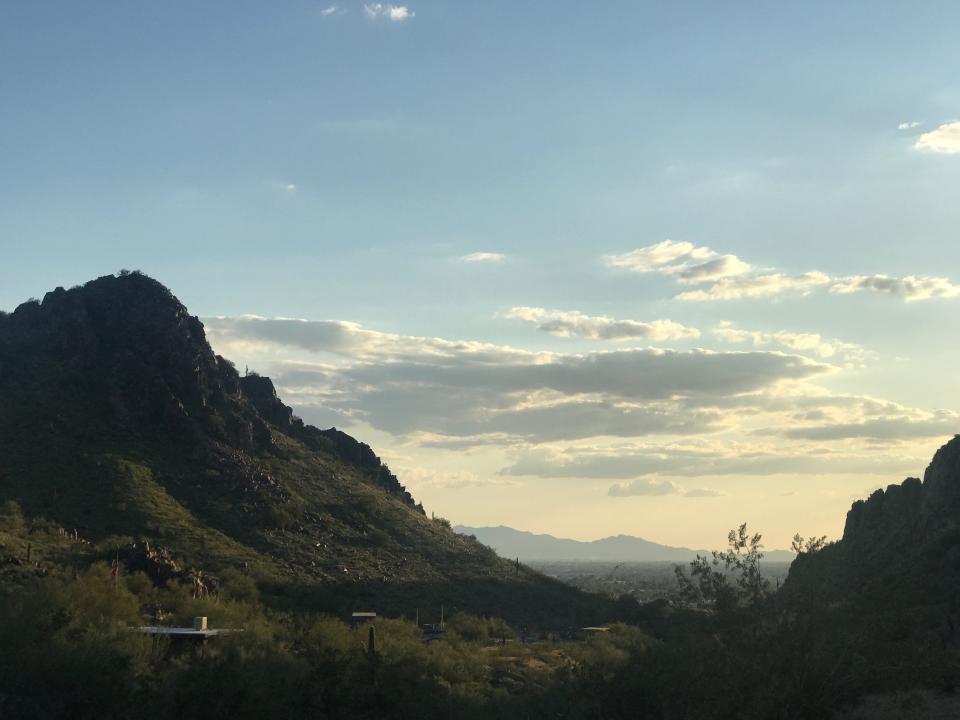Secretary Haaland moves to strike a word offensive to Indigenous people from 600-plus site names

- Oops!Something went wrong.Please try again later.
More than 660 geographic features across the U.S. — nearly 70 in Arizona — include in their name a word considered derogatory and offensive toward Indigenous people, and now Interior Secretary Deb Haaland is seeking to remove the word.
Last November, Haaland issued an order declaring the word a derogatory term. She implemented procedures to remove it from federal usage and directed a newly created task force to identify the uses of the word on geographic locations. The task force finished its review this month and delivered the list to the secretary.
“I am grateful to the Derogatory Geographic Names Task Force for their work to ensure that racist names like sq--- no longer have a place on our federal lands," Haaland said in a written statement. "I look forward to the results of the U.S. Board on Geographic Names vote, and to implement changes as soon as is reasonable."
The word was commonly used for years, found not only on geographic sites, but in older western movies, and even the 1953 Disney animated movie "Peter Pan." It was long used as an alternate name for the Navajo Enemy Way ceremony.
But it is considered derogatory and has historically been used as an offensive ethnic, racial and sexist slur, particularly for Indigenous women.
In 2003, Arizona renamed one of the most visible landmarks in the metro Phoenix area, which had for years used the word. Then-Gov. Janet Napolitano lobbied to rename the mountain Piestewa Peak, after Army Pfc. Lori Ann Piestewa, a Hopi citizen and the first woman killed in the Iraq war. The state's geographic names board voted 5-1 for the change.
There are nearly 70 other places in Arizona that use the derogatory word, with locations in Maricopa, Apache, Cochise, Coconino, Gila, Graham, Greenlee, La Paz, Mohave, Navajo, Santa Cruz and Yavapai counties.
In Phoenix: Council comes together to change the names of streets with names considered offensive
Geographic names board will vote
Davina Smith, who is from Monument Valley, Utah, and works as the tribal liaison coordinator with the National Park Conservations Association, said the word needed to be changed a long time ago.
“If we look at the historical context it goes back east, when that word was associated with a female’s parts,” said Smith, who is running for Utah State House of Representatives in District 69. “We definitely had Europeans come into this land and made that word into a derogatory word.”

In her order last year, Haaland noted that the Department of the Interior is responsible for the stewardship and management of public lands, and would direct the Board on Geographic Names to replace it on the many geographic features with the word in their name.
In February, the department launched a public comment period to provide feedback and review recommended replacement names. The task force received more than 6,600 comments from the public, with an additional 300 comments gained through nation-to-nation consultations.
The task force this week provided replacement name recommendations to the U.S. Board on Geographic Names. The board is expected to vote on the task force recommendations in September, at which point a final list will be published.
'It's another form of healing'
Smith, who is a board member for the Grand Staircase Escalante Partners and co-founder of Women of Bears Ears, said there are eight locations in the San Juan County, Utah, area that bear the derogatory word, including valleys, lakes, springs and even a rock. Near Grand Staircase she found six locations and even a plant having the name of the derogatory word.
She has reached out to the Utah Department of Indian Affairs and awaits the next steps on what to do to get rid of the name at these sites.
“My end goal is that we can get tribes that are connected to these areas and come up with names that have support,” said Smith. “It's another form of healing. We talk about Bears Ears of land, and I feel this is another form of healing to rename them in a positive way.”
The Navajo Enemy Way ceremony, which takes place in the summer, has used the derogatory word as an alternate name, but that has recently changed for the most part. Rather than calling it by the derogatory name, as it was referred to for decades, people are now referring to it as Nidaa'.
“Everything we are starting to realize as derogatory, we also have to make those changes,” said Smith. “I think with all these words, we need to take an initiative and recreate it into a positive matter and that’s what I try to do as much as possible.”
Removing offensive words: Phoenix renames two streets after consulting with the public
When it comes to Disney's "Peter Pan." the word lives on, although a content advisory notice is in place for anyone watching, warning them of negative and racist depictions. The studio said it chose to acknowledge it and learn from it rather than remove it.
Smith said when she comes across non-Native people who tell her "that's just a word. You all use it," Smith disagrees and responds with, “I don’t use it. We don't use it. It’s you all that have been using it.”
“I think when they finally understand the context or the history of how it came about,” said Smith, “they’re like ‘oh gosh.’ It's about educating and letting people know these are the words that need to be removed.”
In addition to the replacement name suggestions to the geographic names board, the Interior Department has also recommended an additional review for seven of the 660 features. The seven locations are considered unincorporated populated places.
Noting that there are unique concerns with renaming these sites, the board will seek out additional review from the local communities and stakeholders before making a final determination.
The Task Force is currently considering the seven sites for additional review in Alaska, California, North Dakota, Tennessee, Texas and Wyoming.
"I think if we can get a least one person to understand, then that person can relay that message and it will keep going on in a respectful matter," said Smith. "For me I will continue to educate people and let them know this is not how we are identified, this is not what we call our women. It will be huge once we get these name changes."
Arlyssa Becenti covers Indigenous affairs for The Arizona Republic and azcentral. Send ideas and tips to arlyssa.becenti@arizonarepublic.com.
Support local journalism. Subscribe to azcentral.com today.
This article originally appeared on Arizona Republic: Interior Secretary Haaland moves to strike offensive word from sites

